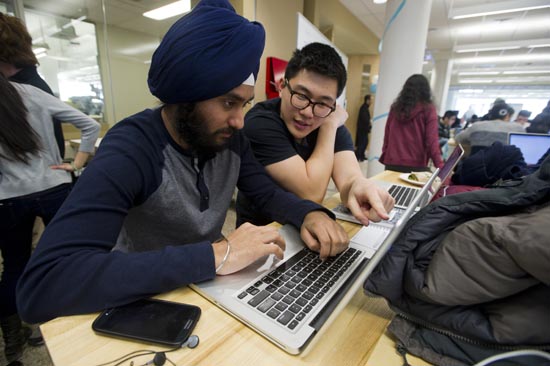Students Doing Good, One App at a Time
BU group develops technology for nonprofits

Volunteers in the Global App Initiative student group develop mobile device apps for nonprofit groups, offering their services for free. Photos by Cydney Scott
Steering low-income students to college and on to better lives has become a kind of national mission. To that end, six BU students, laptops flipped open, huddle in a fluorescent-lit lounge at the Engineering Product Innovation Center. Their screens show the engineering product they’re innovating: pictures of a smartphone app listing steps in the college application process and notices of meetings related thereto.
The end users will be high schoolers at San Francisco’s St. Ignatius College Preparatory, which runs a program for “minority students and students who are going to be first-generation college-bound,” explains Eugene Kwan (ENG’17). An alum of the traditionally white and well-off school, he’s helping design the app, intended in part to replace St. Ignatius’ email alerts to its low-income students. “High school students aren’t very good at checking emails half the time,” he says, a problem licked by phone apps: “Everyone’s on their phone.”
Kwan, his team, and a dozen BU peers laboring this chilly Wednesday night at other tables are all with the Global App Initiative (GAI), a three-year-old BU student group founded to develop free mobile apps for nonprofit groups. St. Ignatius “helped me, so I just want to help them and give back,” says Kwan, who hopes to wrap the app later this year.
Another GAI team recently built an app listing public drinking fountains and businesses offering walk-in water in Boston for the sustainability group BeCause Water, which tries to discourage people from toting environmentally unfriendly plastic water bottles. Yet other students, working for North Carolina’s Freedom Family Foundation, are creating a mobile check-in and sign-up system for clients of the group, which provides counseling, health, and social services to at-risk families.
Those and other far-flung clients demonstrate the aggressive outreach members have done in the three years since GAI’s launch. Many GAI members were “very dedicated to nonprofits prior to Boston University” and have asked colleagues there if they need apps, says Veena Dali (CAS’16), vice president of client relations. “We just look online for nonprofits that could be interested,” says Dali, who then emails likely candidates. GAI leaders also advertise the group at the occasional nonprofit and tech conferences they’re asked to speak at.

No computer coding knowledge is required to join GAI, which offers workshops and online tutorials, or nontechies can opt for administrative duties. “I would say easily 90 percent of our club starts without any programming experience,” says GAI president Santiago Beltran (ENG’17).
“Knowing how to make apps that people use every day seems like a very valuable skill,” says Kwan, who learned coding through GIA. Jeff Kennedy (ENG’16), who worked last semester on the BeCause Water app, says that project was “about building your résumé and maybe doing something good for a local group.”
“For anyone who wants to learn more about app development, or just basic programming concepts, this is a really good way to get some exposure,” says Kennedy. “I would say in many ways better than some classes, because often classes can be very theoretical. You understand the theory behind the idea, but not how you actually construct a product.”
What’s in it for clients? “For a nonprofit like us, it’s extremely important that we can find affordable mobile app development work,” says Matt Thomas, chairman of the board of BeCause Water. (Beltran says commercially developed apps run thousands of dollars.) “You can’t beat the price” with GAI, Thomas says. “We’re very happy” with the quality of the Android phone app that Kennedy developed for his group, he adds.
The chance to do good drew neuroscience major Dali to GAI. “What really appealed to me was the fact that I got to work with nonprofits,” she says. Getting coding experience and the chance to work with fellow students in a non–class setting clinched the deal for her.
For Beltran, GAI tapped his twin passions for engineering and service work; during high school, the St. Louis resident created a nonprofit that brought technology to students. With GAI, he says, “you’re learning and using those skills—and you’re also using them for a really good cause.”
Comments & Discussion
Boston University moderates comments to facilitate an informed, substantive, civil conversation. Abusive, profane, self-promotional, misleading, incoherent or off-topic comments will be rejected. Moderators are staffed during regular business hours (EST) and can only accept comments written in English. Statistics or facts must include a citation or a link to the citation.